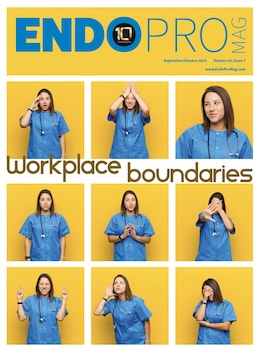Cedars-Sinai’s upcoming Sept. 13 conference on Women and Inflammatory Bowel Disease (IBD) will highlight women’s unique experiences with the disorder and provide relevant information and guidance for both patients and providers, says gastroenterologist Puja V. Khanna, MD, the clinical director of the Cedars-Sinai Inflammatory Bowel Disease Women’s Health Program.
“In the morning, we will host a clinician track on best practices for treating women with IBD,” Khanna said. “In the afternoon, patients and families are invited to a dedicated session covering pregnancy, fertility, nutrition, mental health and more. There is also time for patients and providers to connect.”
An estimated 3 million people in the U.S. have inflammatory bowel disease, according to the Centers for Disease Control and Prevention. The disorder produces chronic and often destructive inflammation in the digestive tract. The two most common forms of IBD are Crohn’s disease and ulcerative colitis. While some cases can be mild and manageable, many IBD patients are faced with a constellation of health problems including severe diarrhea, malnutrition, dangerous blood clots, and extensive and painful scarring.
IBD occurs in men and women at about the same rate, but the disease can leave women facing unique health challenges. There can be difficult decisions about proceeding with certain drug therapies while trying to conceive or during pregnancy and menopause.
“For women living with IBD, simply knowing that their needs are recognized and that there is a community and program designed for them can be incredibly empowering,” Khanna said
The Cedars-Sinai Newsroom interviewed Khanna about how IBD impacts the health and wellbeing of women, including finding a good healthcare provider and effective therapies available to them.
In what ways can IBD impact women and men differently?
While inflammatory bowel disease occurs at about the same rate in both sexes, women often present differently. After age 30, Crohn’s disease is more common in women than in men. We also see sex-specific patterns: Women are more likely to have Crohn’s limited to the colon, less extensive ulcerative colitis, and more frequent extraintestinal conditions, such as eye inflammation and skin disorders. Recognizing these differences is critical for timely diagnosis and effective management.
Are there differences in diagnosis, disease course or treatment protocols for women?
The diagnostic workup for IBD is the same regardless of sex and typically involves colonoscopy, imaging, lab testing. However, the course of the illness can vary. Women may experience flares around hormonal changes, such as those occurring during menstruation or pregnancy.
Treatment approaches are generally the same for men and women, but side effects can differ. For example, women are more likely to develop drug-induced lupus with certain biologic therapies. Providers must stay alert to sex-based responses to various treatments for IBD. For women of childbearing age, therapy selection must consider whether a medication is safe in pregnancy. Most of them are, but not all.
Does IBD impact a woman’s reproductive life, including menstruation, fertility and pregnancy?
Absolutely. Many women report worsening symptoms during menstruation due to hormone fluctuations. Fertility can be reduced in women with active inflammation or prior pelvic surgery, although more research is needed on that front. Pregnancy outcomes are best when disease is in remission for at least three to six months before conception. Interestingly, we have found that some women with IBD may actually experience improvement in symptoms during pregnancy.
Most IBD medications can be safely continued during pregnancy, particularly when the disease is under control. Methotrexate, an immunosuppressant medication, should be avoided. There are other classes of medications, such as JAK inhibitors, whose safety and use should be discussed with your provider. At Cedars-Sinai, our IBD Pregnancy and Fertility Clinic brings gastroenterology and obstetrics together so women receive coordinated care.
Do women find it challenging to get an accurate IBD diagnosis? What advice would you offer?
Many women do face delays. They may see multiple providers before reaching a gastroenterologist who recognizes their symptoms as inflammatory bowel disease. My advice is to advocate for yourself. If you are not being heard, seek a second opinion, ideally at a dedicated IBD center. A colonoscopy and appropriate testing are essential to confirm the condition.
How do IBD patients benefit from a multidisciplinary approach to care?
One young woman in her 20s came to me after years of aggressive Crohn’s disease. She had seen specialists across the country, endured multiple treatments, and was facing another surgery. She broke down in tears, telling me she felt abandoned by her doctors. I reassured her and then brought her case to our weekly IBD meeting where top experts could collaborate on her care. That sense of not being given up on, and of building a trusted partnership with a care team, can be life-changing for patients living with a chronic illness.
The Women and IBD conference will take place at Cedars-Sinai on Saturday, Sept. 13. Attendance is free but registration is required.
Those interested in attending can email [email protected] to register and receive more information.






